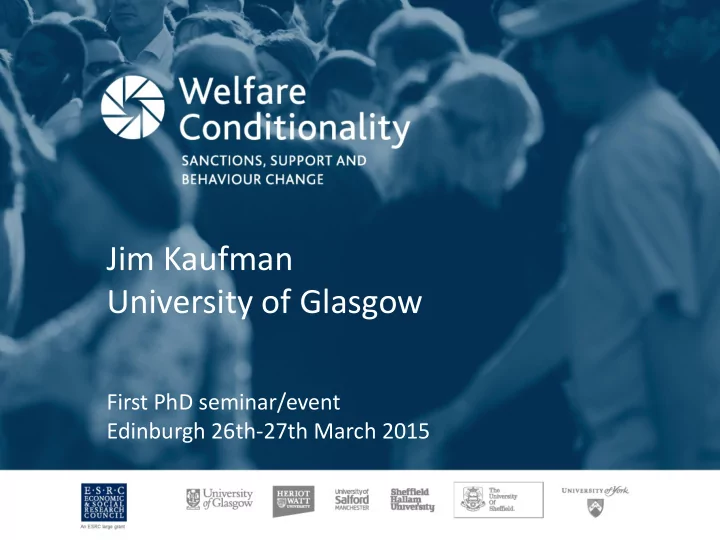

Welfare Conditionality PhD Seminar 1 Fiona Jackson Heriot-Watt University Jim Kaufman University of Glasgow First PhD seminar/event Edinburgh 26th-27th March 2015
‘ Behaviour c hange’ in action From ‘field’ to desk and back again
This list was a very simple thing, a checklist, something to be worked down with a highlighter and Biro, but it also seemed to refer to something unimaginably complex - a whole world of lives and troubles and situations about which I knew next to nothing. Stills from ‘Welfare’ (Frederick Wiseman, 1975)
Dilemmas and double binds (impossible objects, impossible situations) Detail from M.C. Escher, ‘Ascending and Descending’, Lithograph 1960
Symbolic, interpretive, relational ‘The Interview’ ( Harun Farocki, 1996)
Research Design • Relational ethnography (Desmond 2014) – observations and in- depth interviews • Observations – dependent on access, but ideally one Jobcentre Plus office, and one Work Programme provider, 6 months • Interviews – 10 advisers, 10 welfare recipients • Focus on experience, interaction and intersubjective understanding. What occurs between advisers and claimants? • BUT ….. need to be flexible with the design, follow all leads, and adapt to the field.
Access (through a glass, darkly) Access is structured by the field – it reflects its terrain and topography, which is to say, its relations of power, and the position of the researcher in relation to the researched (Duke 2002; Reeves 2010) …from ‘field’ to desk and back again (almost).
References • Auyero, J. (2012). Patients of the State: The Politics of Waiting in Argentina . Durham: Duke University Press. • Brodkin, E. Z. (2013). Commodification, Inclusion, or What? Workfare in Everyday Organizational Life., in: E. Z. Brodkin & G. Marston (Eds.), Work and the Welfare State: Street-Level Organizations and Workfare Politics . Georgetown University Press. • Desmond, M. (2014). Relational ethnography. Theory and Society , 43 (5), pp. 547 – 579. • Duke, K. (2002). Getting beyond the “official line”: Reflections on dilemmas of access, knowledge and power in researching policy networks. Journal of Social Policy , 31 (01), pp. 39 – 59. • Farocki, H. (1996). The Interview . Germany. • Howe, L. (1990). Being Unemployed in Northern Ireland: An Ethnographic Study . Cambridge University Press. • Lipsky, M. (1980). Street-Level Bureaucracy: Dilemmas of the Individual in Public Services . Russell Sage Foundation. • Maynard-Moody, S., & Musheno, M. (2000) . State Agent or Citizen Agent: Two Narratives of Discretion. Journal of Public Administration Research and Theory , 10 (2), pp. 329 – 358. • Reeves, C. L. (2010). A difficult negotiation: fieldwork relations with gatekeepers. Qualitative Research , 10 (3), pp. 315 – 331. • Watkins-Hayes, C. (2009). The New Welfare Bureaucrats: Entanglements of Race, Class, and Policy Reform . University of Chicago Press. • Wiseman, F. (1975). Welfare . Zipporah Films, USA.
Recommend
More recommend